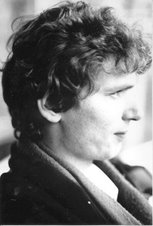
Yazidis are members of a small religious group. Their religion is little known to outsiders, but contains elements of Judaism, Christianity and Islam and also includes the veneration of Peacock Angel, as shown above.
They were attacked yesterday, Wednesday August the 15t by Al-Qaida, and probably the most violent attack after the fall of Saddam Hussein.

As they believe in a Supreme God, they don't believe in hell, sin or the devil.
The Yazidis' cultural practices are observably Kurdish, and almost all speak Kurmanjî (Northern Kurdish), with the exception of the villages of Bashiqa and Bahazane in Northern Iraq, where Arabic is spoken. Kurmanjî is the language of almost all the orally transmitted religious traditions of the Yazidis. Thus, religious origins are somewhat complex.
The Yazidis, perhaps because of their secrecy, also have a place in modern occultism. G. I. Gurdjieff wrote about his encounters with the Yazidis several times in his book Meetings with Remarkable Men, mentioning that they are considered to be "devil worshippers" by other ethnicities in the region.
G.I. Gurdjieff is a Greek Armenian thinker who spent some time in Istanbul in the beginning of the 20th century.
And he is most notable for introducing the Fourth Way, while he is also recognized for introducing other concepts, such as the Enneagram.
His mystic teaching influenced management theories in the last decade of the 20th century.
Gurdjieff's teaching mainly addresses the question of people's place in the Universe and their possibilities for inner development. He also emphasized that some people live their lives in a form of waking sleep, and that higher levels of consciousness, higher bodies, and various inner abilities are possible.
Gurdjieff taught people how to increase and focus their attention and energy in various ways, and to minimize daydreaming and absentmindedness. According to his teaching, this inner development in oneself is the beginning of a possible further process of change, whose aim is to transform a man into what Gurdjieff believed he ought to be.
It's sad that Yazidis, although known about the stoning of Du’a Khalil Aswad in April of this year, were victims of this brutal attack.




3 comments:
I read Meeting with Remarkable Men probably about a year ago after visiting his birthplace Gyumri and spending a day there with a local scholar and expert on Gurdjieff.
Yezidis are the largest minority in Armenia (that doesn't mean too much in a country that is 97% homogeneously Armenian). Freelancejournalist Onnik Krikorian has written extensively on the Yezidis in Armenia on his blog (link: http://oneworld.blogsome.com) and I remember Michael Totten posted an interesting article on the Yezidis in Northern Iraq a while back on his excellent blog (www.michaeltotten.com). I am sorry, I am too lazy right now to make the links into clickable links.)
no problem Myrthe..))
I know Gurdjieff's work through the Dutch Daniel Offman, a famous Management consultant.
His work about 'kern-kwadranten' are based upon Gurdjieff thinking..
I had no idea that Gurdjieff had so much influence on management theories. That's very interesting.
My boyfriend is slowly slowly working his way through some of Gurdjieff's books. He is much more "into Gurdjieff" than I am, but I still find him an interesting person.
Post a Comment